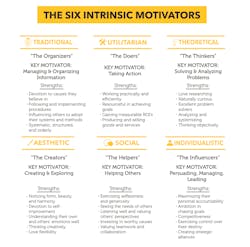Financial rewards are not the only way to increase the performance of an individual or team. Fear of losing is often a more powerful motivator than the promise of winning. Therefore, emotionally intelligent leaders find ways to mitigate the perception that there is something to “lose.”
Daniel Kahneman’s experiments in motivation showed that when people were offered a chance to accept or reject a gamble, most people refused to take a bet unless the possible payoff was around double the potential loss. In other words, you can offer all the carrots you want, but your employees may end up more motivated by their fear of losing out on the carrot than the possibility of winning it.
Only when we understand intrinsic motivators and long-term goals can we build commitment. If people know they are part of the team and their work is valued, then they become more loyal and committed. Full emotional intelligence moves from me to we and into why. Successful and sustainable motivation is about why. An emotionally intelligent leader’s job is to learn people’s why. Broadly, we can break down and begin to cultivate motivation by looking at six intrinsic motivational drivers.
The Six Drivers of Intrinsic Motivation
Each of these core motivators refers to what makes people tick, and why they do what they do. Take a moment and read them carefully.
- Do you recognize yourself in any of these categories?
- What about the person you work with the most?
Here’s a little more about these motivators:
1. Theoretical
What is behind the intrinsic theoretical motivator? The desire to learn.
What’s an emotionally intelligent way to work with this motivator?
Give opportunities for these individuals to learn. Provide them with opportunities to problem-solve. When asking for input, give them time to give you research-supported answers and don’t ask them to focus on subjective experiences over objective facts.
Unleashing Theoretical:
- Give them assignments that require them to learn and share that knowledge with others.
- Get them involved in training or mentoring others.
Give them a forum at meetings to go over specifics and details. They want to share data and information with others.
2. Utilitarian
What is the utilitarian motivator? The desire to see high return on investments for time, energy, and resources.
What’s an emotionally intelligent way to work with this motivator?
Ask Utilitarian-minded team members to work on projects that efficiently use systems, time, or materials; provide them with projects that have tangible results or outcomes; encourage their resourceful problem-solving skills.
Unleashing Utilitarian:
- Assign them tasks that can be done quickly. They like getting a lot of things done in short amounts of time.
- They pride themselves in doing the job with limited resources, so you can take two approaches here. First, you can give them some tasks that don’t require a lot of resources to succeed – they’ll take pride in making something out of very little. Second, you can put them in a challenging role that requires them to perform, and to figure out how to most efficiently get things done. Recognize their eye for efficiency.
3. Aesthetic
What is it? The desire to create and experience harmony, beauty, and balance.
What’s an emotionally intelligent way to work with this motivator?
Create flexible processes and systems to encourage creativity. Respect their desire for balance between their work and home life. Find calm, pleasing, and comfortable spaces for them to work in.
Unleashing Aesthetic:
- Give them opportunities to be creative by allowing them space and time to put their own mark on projects. They might improve it in ways you never considered. Balance this approach with clear expectations around outcomes and timelines because perfectionism may get in the way.
- Give them flexibility in scheduling their work and home life when appropriate. Show that you value all their priorities.
- Give them opportunities to improve their work environment—they are highly attuned to the look, feel, and functionality of their environments.
4. Individualistic
What is it? The desire to lead, create strategic alliances, and maximize personal accountability.
What’s an emotionally intelligent way to work with this motivator?
Don’t limit opportunities for advancement when they are ready and have proved themselves—they particularly value leadership roles; provide recognition for their accomplishments; leverage their motivation to lead and achieve for the good of the group.
Unleashing Individualistic:
- Let them set the rules, within limits. Ask them to develop a plan, but make sure you provide feedback before they execute their plan.
- They like outside recognition, so do and say things that show your appreciation. Have career pathing conversations with them regularly to provide feedback, coaching, and assurance that you see a future path for them.
5. Social
What is it? The desire to help others.
What’s an emotionally intelligent way to work with this motivator?
Provide opportunities for collaboration and other human interactions and recognize that they will often place higher value on people over tasks. For those who are socially motivated, difficult people decisions will be especially hard for them and they may avoid it, so provide support and accountability.
Unleashing Social:
- Demonstrate the human impact their work has.
- Ask them to mentor others, get involved in internal training programs, or be a resource for onboarding new hires.
- Focus on the organization’s commitment to its people with opportunities to socialize and build camaraderie.
6. Traditional
What is it? The desire to follow a set of principles to guide their life.
What’s an emotionally intelligent way to work with this motivator?
Align their work with projects that are congruent with their core values and provide them with structure, order, and clarity. This motivational style, more than any other factors, needs significantly more structure and order to be effective.
Unleashing Traditional:
- Give them structure by providing guidelines around a task or project, and clarity on who holds the authority for decisions. Once they are comfortable and familiar with the process, ask for input on process improvements.
- State clear rules, requirements, and specifications around tasks.
- They value fairness, so focus on ethics, standards, equality, and inclusiveness. Leaders inspire motivation through the team environments they create.
As a leader, you can create an environment that unleashes and taps into employee motivation. You can do this through a team and the larger workplace environment.
Here’s the truth: motivation has always been a tricky thing. Rewards and external tricks can work in the short term. But leaders make a mistake in thinking that their external application of rewards or punishment makes any lasting difference to how people operate. Many organizations have focused on employee engagement and default to reward programs, merit pay, or lifestyle perks to attract and retain talent. These are expensive and miss the mark. Employees can’t be bullied or bribed to stay.
According to Gallup engagement surveys, the majority of employees who voluntarily leave a workplace report a poor relationship with their supervisor as the number one contributing factor. Are you creating an emotionally intelligent work environment by unleashing your employee’s intrinsic motivators?
Incorporating EI into your motivation and creating a trusting environment that motivates employees the right way may stop you from driving employees away.
Kerry Goyette, founder & president of Aperio Consulting Group, a corporate consulting firm. Aperio utilizes workplace analytics and research-based strategies to build high performance teams. Kerry’s work has been featured in Fast Company, Entrepreneur, CEO World Magazine, Glassdoor, and Quartz at Work. Emotional Intelligence was name one of Forbes’ Best Summer Reads for 2019.
About the Author
Kerry Goyette
Founder, president
Kerry Goyette, founder & president of Aperio Consulting Group, a corporate consulting firm. Aperio utilizes workplace analytics and research-based strategies to build high performance teams. Kerry’s work has been featured in Fast Company, Entrepreneur, CEO World Magazine, Glassdoor, and Quartz at Work. Emotional Intelligence was name one of Forbes’ Best Summer Reads for 2019.
Kerry has consulted for organizations around the world and is an international speaker with the popular TEDx talk, "Stop Trying to Motivate Your Employees.” She was the keynote speaker at the 2017 Global HR Inside Summit in Vienna, Austria and the keynote speaker at the 2018 Best Employers Awards in Barbados.
She is a Certified Professional Behavior Analyst and Certified Forensic Interviewer with postgraduate studies in psychometrics. She serves on the University of Missouri MBA Advisory Board, works as an affiliate adjunct faculty for MU School of Journalism and co-leads the Centennial Investors Research Task Force, studying predictors of entrepreneurial success.

